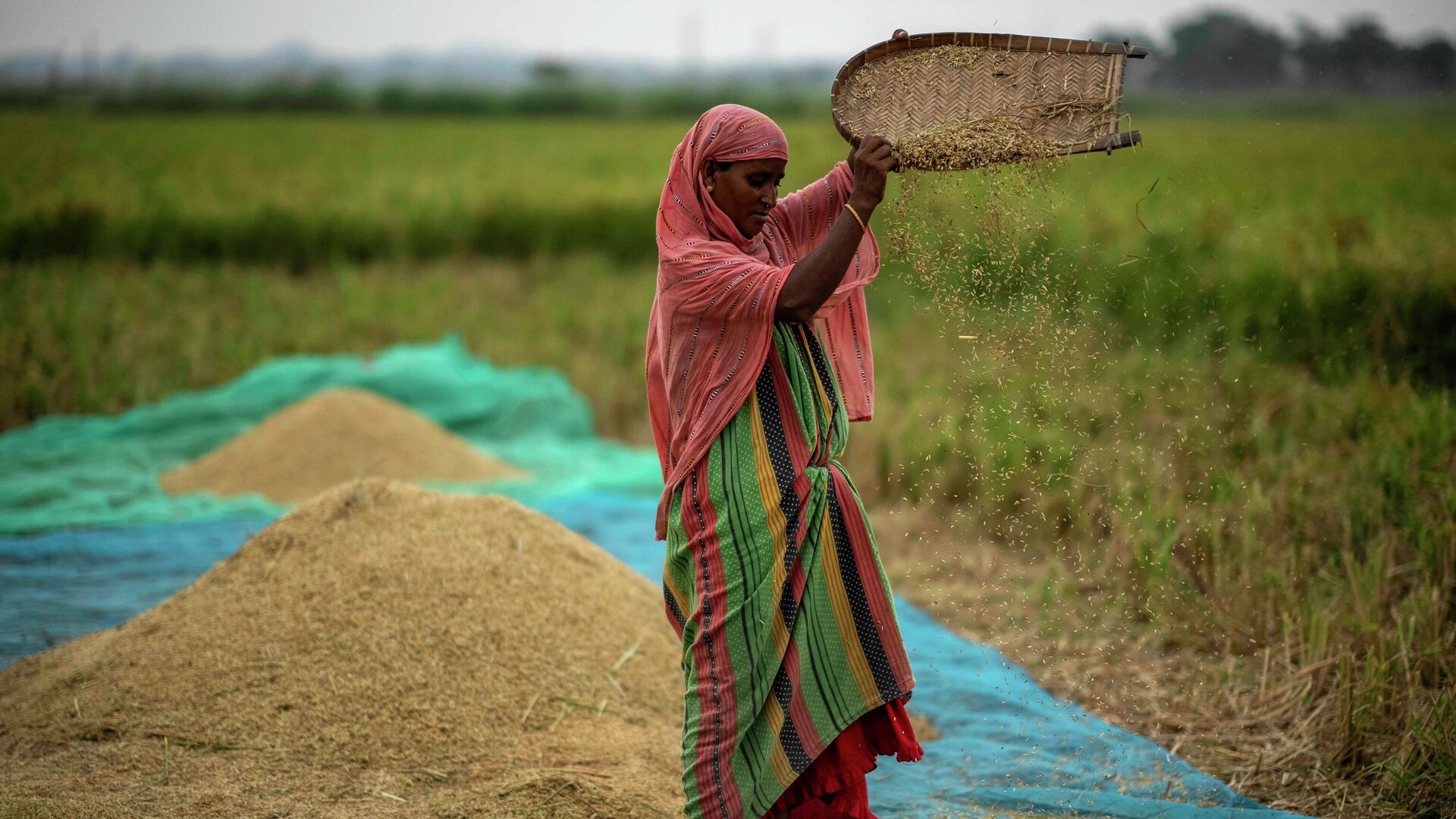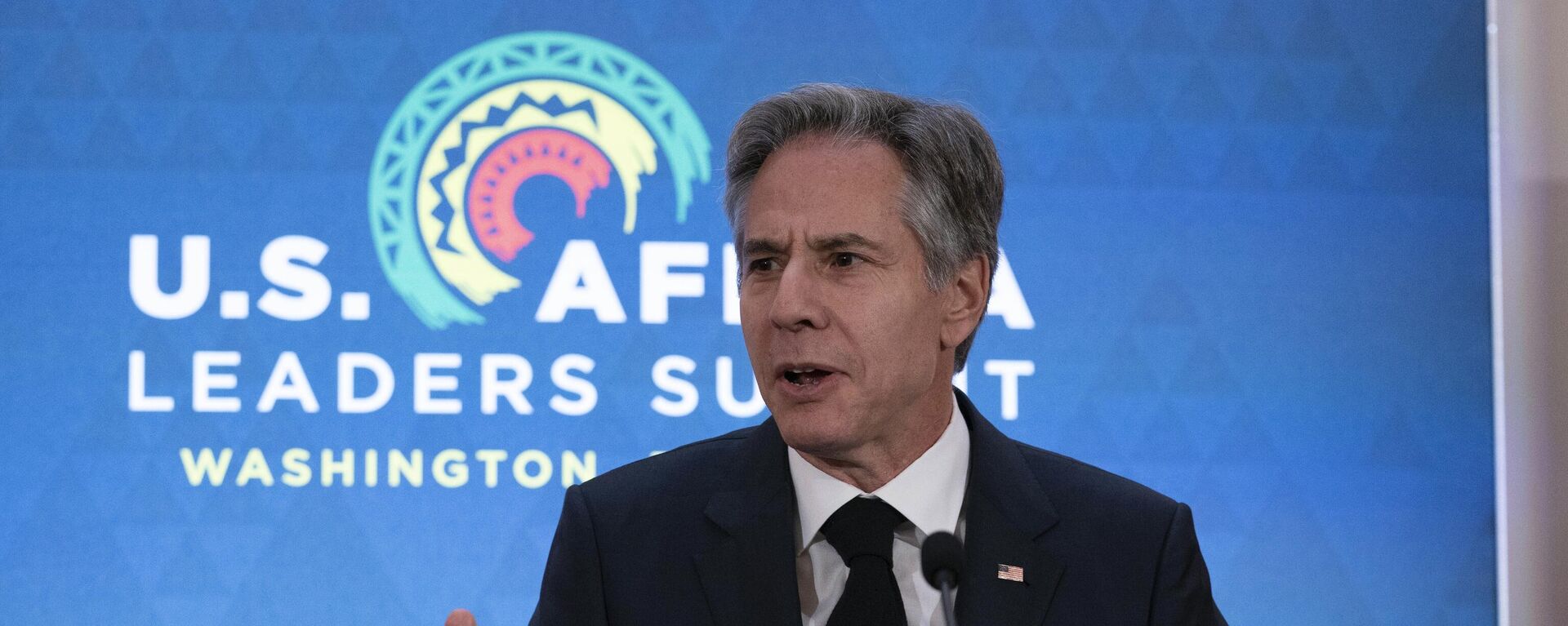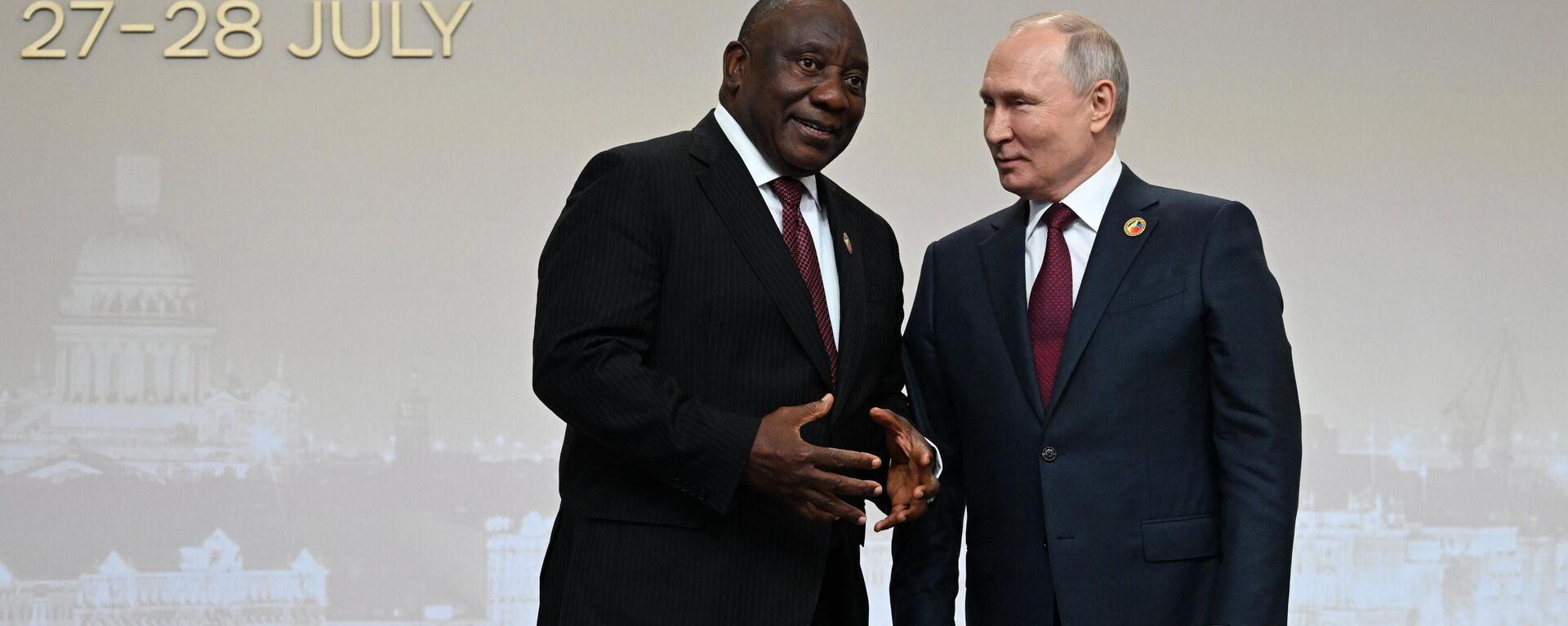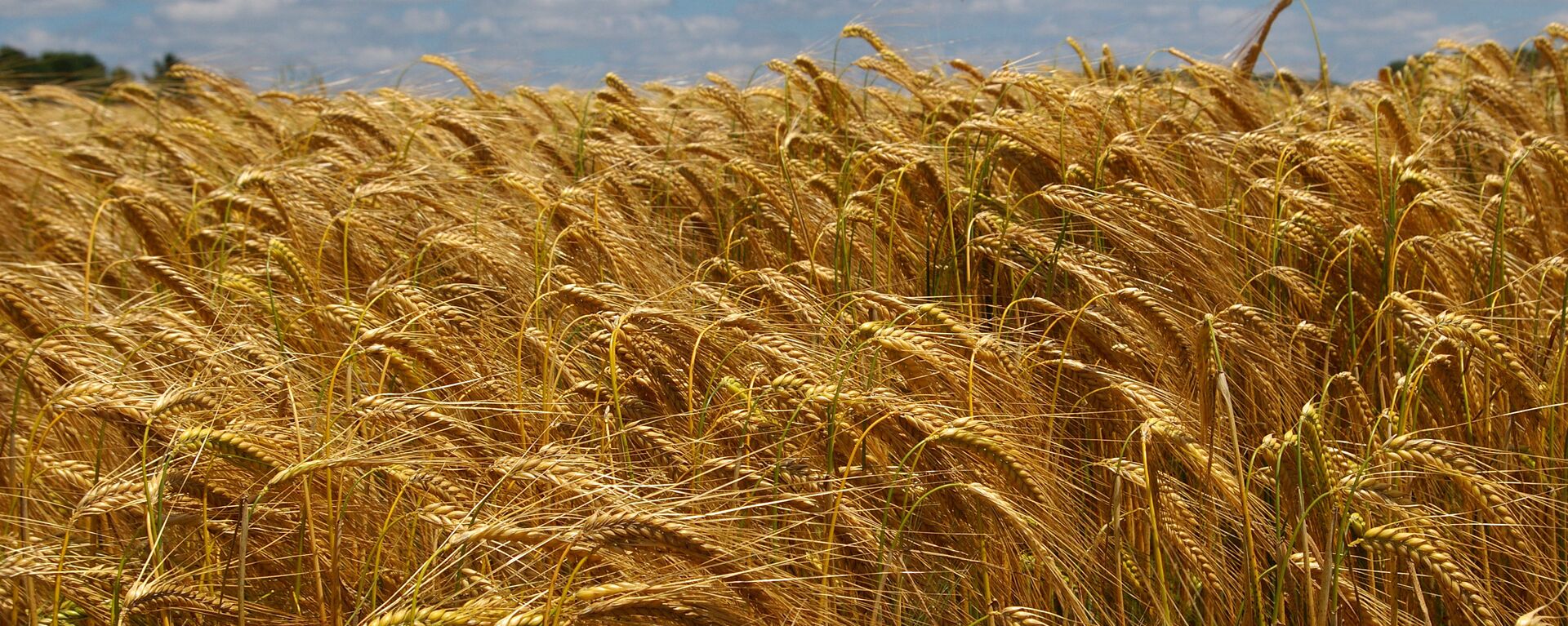https://en.sputniknews.africa/20230814/poor-countries-main-victims-of-western-induced-grain-price-crisis-expert-says-1061322758.html
Poor Countries Main Victims of Western-Induced Grain Price Crisis, Expert Says
Poor Countries Main Victims of Western-Induced Grain Price Crisis, Expert Says
Sputnik Africa
Global grain and fertilizer prices have risen sharply recently to record highs not seen in a decade. Wheat prices rose 8.2% on the European exchange to €253.75... 14.08.2023, Sputnik Africa
2023-08-14T18:02+0200
2023-08-14T18:02+0200
2023-08-14T18:02+0200
grain
grain deal
black sea grain initiative
crisis
ukraine crisis
world food crisis
opinion
https://cdn1.img.sputniknews.africa/img/07e7/08/0e/1061330570_0:0:3072:1728_1920x0_80_0_0_b0323680a1b61a07979de1e072febca9.jpg
The global food system is facing a severe crisis as grain and fertilizer prices soar to record levels in recent weeks. The crisis has been triggered by a combination of factors, including climate change, export bans and Western sanctions. But the main losers are poor countries that depend on grain imports for their food security and livelihoods, according to an expert.Nourhan ElSheikh, an expert of the Valdai Discussion Club, professor of political science at Cairo University, and a member of the Egyptian Council for International Affairs, told Sputnik Africa that the crisis has multiple dimensions and causes.ElSheikh cited a recent report by the United Nations Food and Agriculture Organization that warned of the largest increase in global grain prices in more than a decade. She argued that the shortage of fertilizers has had a more significant impact on grain prices than the grains themselves, leading to a decline in production.The expert said that one of the main factors of such crises was the ban of white rice exports by India, which is the largest exporter of rice, contributing more than 40% of world exports. India’s decision was motivated by the impact of climate change and crop damage on its domestic production. This affected many Asian and African countries, who rely on Indian rice for their consumption.Unfair AccusationsAnother factor was Russia's ban on rice exports, aimed at ensuring food security for its citizens and protecting its domestic market from overpricing in the wake of India's ban.Russia is a major exporter of wheat and other grains, as well as fertilizers. However, its role in the global food system has been hampered by Western sanctions and restrictions, which have targeted its agricultural sector and related services.The International Monetary Fund (IMF) warned that Moscow's withdrawal from the Black Sea Initiative, brokered by Turkiye and the UN at the start of the ongoing Russian-Ukrainian conflict, could push up grain prices by around 15%.ElSheikh said that Western countries have never fulfilled their obligations according to the initiative, with regard to lifting the restrictions imposed on the Russian Agricultural Bank, which obstructs the movement of Russian exports from fertilizers, grains and oils, as well as those imposed on insurance companies and ship services that deal with Russia.Beneficiaries vs VictimsThe expert added that the EU was the main beneficiary of the grain initiative, having purchased 40% of the total 33 million tons of Ukrainian grain that came out within the framework of the initiative, known as the grain deal.Moreover, ElSheikh argued that the rise in wheat price serves American interests, as the US is the second-largest exporter of wheat. She noted that the value of US wheat jumped by 8.5%, which is the highest ever.Professor ElSheikh likewise stressed that Moscow has continued to ship grain to various countries around the world, including Africa, despite US and European sanctions and restrictions. She noted that in March, Egypt received the largest shipment of Russian wheat since 1986. In addition, she emphasized that Russia has also taken the initiative to provide free grain and fertilizer to six African countries most in need.Way Out of CrisisProfessor ElSheikh said that the way out of the ongoing grain and fertilizer price crisis requires "progressive steps" forward from countries in the Global South.She said the West could easily curb grain prices and stabilize the global grain market by responding positively to Moscow's "fair demands" under the recently suspended deal.Russia suspended its participation in the Black Sea Grain Initiative last month, citing the West's systematic efforts to block Russian food and fertilizer exports and the fact that only 3 percent of Ukrainian grain exported under the grain deal actually went to needy nations.She referred to the Russian presidential decree issued on August 9, which allows foreign buyers to open special accounts in rubles or certain currencies in Russian banks for this purpose, and use them in agricultural export settlement operations.
https://en.sputniknews.africa/20230808/1061175869.html
https://en.sputniknews.africa/20230729/south-african-president-thanks-russia-for-offering-free-grain-supplies-1060890082.html
https://en.sputniknews.africa/20230731/burkina-fasos-president-vows-to-do-everything-so-that-people-know-these-grains-come-from-russia-1060939002.html
Sputnik Africa
feedback@sputniknews.com
+74956456601
MIA „Rossiya Segodnya“
2023
Muhammad Nooh Osman
https://cdn1.img.sputniknews.africa/img/07e7/04/0a/1058467512_0:0:1280:1280_100x100_80_0_0_ec723833bcbfcaed2e21952965ad99e4.jpg
Muhammad Nooh Osman
https://cdn1.img.sputniknews.africa/img/07e7/04/0a/1058467512_0:0:1280:1280_100x100_80_0_0_ec723833bcbfcaed2e21952965ad99e4.jpg
News
en_EN
Sputnik Africa
feedback@sputniknews.com
+74956456601
MIA „Rossiya Segodnya“
Sputnik Africa
feedback@sputniknews.com
+74956456601
MIA „Rossiya Segodnya“
Muhammad Nooh Osman
https://cdn1.img.sputniknews.africa/img/07e7/04/0a/1058467512_0:0:1280:1280_100x100_80_0_0_ec723833bcbfcaed2e21952965ad99e4.jpg
grain, grain deal, black sea grain initiative, crisis, ukraine crisis, world food crisis
grain, grain deal, black sea grain initiative, crisis, ukraine crisis, world food crisis
Poor Countries Main Victims of Western-Induced Grain Price Crisis, Expert Says
Muhammad Nooh Osman
Writer/Editor
Longread
Global grain and fertilizer prices have risen sharply recently to record highs not seen in a decade. Wheat prices rose 8.2% on the European exchange to €253.75 ($276.98) per tonne, with corn prices up 5.4% and rice prices jumping 19.7%, the highest since 2011, according to the UN's Food and Agriculture Organization (FAO).
The global food system is facing a severe crisis as grain and fertilizer prices soar to record levels in recent weeks. The crisis has been triggered by a combination of factors, including climate change, export bans and
Western sanctions. But the main losers are poor countries that depend on grain imports for their food security and livelihoods, according to an expert.
Nourhan ElSheikh, an expert of the Valdai Discussion Club, professor of political science at Cairo University, and a member of the Egyptian Council for International Affairs, told Sputnik Africa that the crisis has multiple dimensions and causes.
ElSheikh cited a recent
report by the United Nations Food and Agriculture Organization that warned of the largest increase in global grain prices in more than a decade. She argued that the shortage of fertilizers has had a more significant impact on grain prices than the grains themselves, leading to a decline in production.
"Fertilizers' prices have jumped faster than grain prices. That affected the availability of food, with the decrease in the production of corn, rice, soybeans and wheat as a result of fertilizers’ shortage. This coincides with a sharp rise in the vegetable oil price index by 12.1%," she said. "Such unprecedented swell in grain prices raised many concerns, not only in poor countries but in Europe and the whole world as well."
The expert said that one of the main factors of such crises was the ban of white rice exports by India, which is the largest exporter of rice, contributing more than 40% of world exports. India’s decision was motivated by the impact of climate change and crop damage on its domestic production. This
affected many Asian and African countries, who rely on Indian rice for their consumption.
Another factor was Russia's ban on rice exports, aimed at ensuring food security for its citizens and protecting its domestic market from overpricing in the wake of India's ban.
"Nevertheless, Western media and politicians are trying to blame only Russia for the excessive rise in grain prices. They attribute the crisis to Russia's suspension of the Black Sea Grain Initiative," ElSheikh said.
Russia is a major exporter of wheat and other grains, as well as fertilizers. However, its role in the global food system has been hampered by Western sanctions and restrictions, which have targeted its agricultural sector and related services.
The International Monetary Fund (IMF) warned that Moscow's withdrawal from the Black Sea Initiative,
brokered by Turkiye and the UN at the start of the ongoing Russian-Ukrainian conflict, could push up grain prices by around 15%.
"In fact, the United States and European countries are primarily responsible for the crisis," the Egyptian professor said. "The Grain Initiative has two parts, The Ukrainian grain exports, and the Russian ones. The first part was fully implemented, while the second part did not see the light due to political considerations related to the Western sanctions against Russia. Although Russian grain is the largest in size and has the pivotal role of combating the global grain crisis."
ElSheikh said that Western countries have never fulfilled their obligations according to the initiative, with regard to lifting the restrictions imposed on the Russian Agricultural Bank, which obstructs the movement of Russian exports from fertilizers, grains and oils, as well as those imposed on insurance companies and ship services that deal with Russia.
"Russia extended the Grain Initiative agreement three times in the hope of fair and just implementation, but to no avail," she noted. "Washington and Europe have insisted on implementing only what was relevant to Ukrainian grain exports, as it serves their interests."
The expert added that the EU was the main beneficiary of the grain initiative, having purchased 40% of the total 33 million tons of Ukrainian grain that came out within the framework of the initiative, known as the grain deal.
Moreover, ElSheikh argued that the rise in wheat price serves American interests, as the US is the second-largest exporter of wheat. She noted that the value of US wheat jumped by 8.5%, which is the highest ever.
"The poor countries are the main victims of the crisis. Those countries are not interested in the Grain Initiative, as they got less than 3% of the Ukrainian grain that came out. But they remain the most in need of Russian grain, and the most painful of the high prices of grain and fertilizer," the political scientist explained.
Professor ElSheikh likewise stressed that Moscow has
continued to ship grain to various countries around the world, including Africa, despite US and European sanctions and restrictions. She noted that in March, Egypt received the largest shipment of Russian wheat since 1986.
In addition, she emphasized that Russia has also taken the initiative to provide free grain and fertilizer to six African countries most in need.
"It is impossible to imagine the stability of the global market for grain and fertilizers without Russia, as it is the first source of them in the world. Russia has huge stocks of grain. It can export 60 million tons this year. That represents 20% of world grain exports, of which 48 million tons of wheat, 17.6% of the total world wheat exports."
Nourhan ElSheikh
Professor of political science at Cairo University
Professor ElSheikh said that the way out of the ongoing grain and fertilizer price crisis requires "progressive steps" forward from countries in the Global South.
She said the West could easily curb grain prices and stabilize the global grain market by responding positively to Moscow's "fair demands" under the recently suspended deal.
Russia suspended its participation in the Black Sea Grain Initiative last month, citing the West's systematic efforts to block Russian food and fertilizer exports and the fact that only 3 percent of Ukrainian grain exported under the grain deal actually went to needy nations.
"Due to the fact that the United States does not care about the fate of billions of peoples in Asia and Africa, the latter must move independently to save themselves. A number of measures are needed in cooperation with Moscow to overcome the problems of money transfers, payment, shipping and insurance," ElSheikh said.
She referred to the Russian presidential decree issued on August 9, which allows foreign buyers to open special accounts in rubles or certain currencies in Russian banks for this purpose, and use them in agricultural export settlement operations.
"Countries that seek to maintain their food security and protect their national interests must respond to this step and work alongside Russia towards a new global economic and financial system that is safer and more just for all," ElSheikh concluded.





